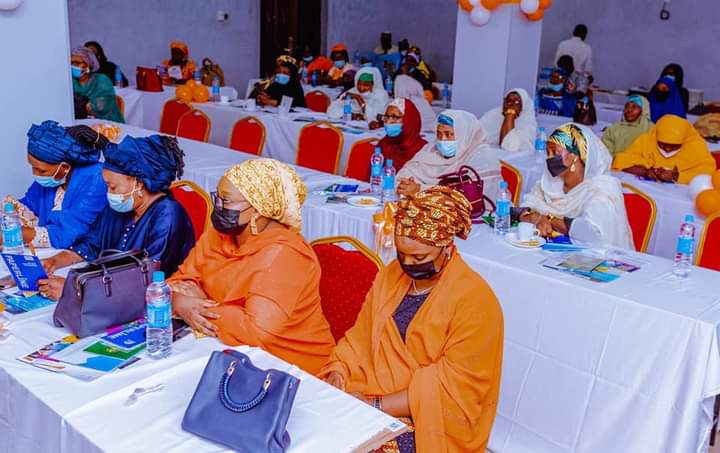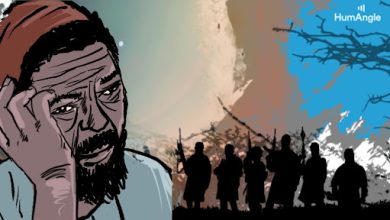Are Anti-Violence Laws Helping Survivors In Nigeria’s Kaduna State?
When a law aimed at making it easier for victims of violence to charge their assailants was put on the statute books in the northwestern state, it brought about a significant change in the number of reported cases of rape. But there is still so much to be done to help survivors get justice.

When Halima* was a child, she was sexually assaulted by an older male cousin, who had been raised in the same house by her parents.
“I can’t remember exactly how old I was when it happened, but I still have snippets of the memory. For years, I was fine and even interacted normally with the person, but recently I find myself getting triggered when I see him,” she told HumAngle.
In many cases of child sexual abuse, victims may not fully comprehend what has happened to them at the time of abuse and many end up never reporting the abuse. About 91 per cent of child sexual abuse is said to be done by someone trusted by the family.
It is people like Halima that the Violence Against Persons (Prohibition), otherwise known as the VAPP Act, was created to help. Now five years after their adoption in Kaduna, rights activists in the state say they are having an impact. But is it all good news?
Saving others
Halima never told her story to anyone until she made it to therapy.
“I didn’t trust my family to do the right thing and stand by me, but once, when I noticed him trying to form a suspicious connection with my younger sister, I talked to my older sister and told her my fears, withholding my own story,” she continued.
She discovered she was not the first person to speak up about him being “creepy”.
That gave her some support. What made her feel more confident is the domestication -the acceptance of a new law created at federal level into the state’s law book- of the VAPP Act.
“I was so excited to learn about the VAPP Act and how it can help survivors of abuse even though getting justice may be too late for me. I lent out my voice on social media to create awareness about the Act”. She was in support of several public awareness actions and rallies in Kaduna.
Now in her late twenties, Halima has spent over a decade trying to create awareness on sexual violence. She is now an advocate for victims of violence and an activist.
“In some ways, it feels like going back in time and saving the young girl that was me,” she says.
New era
The Violence Against Persons (Prohibition) Act was established in 2015 to help tackle all the different forms of violence against persons in the country, whether such violence was in a private or public capacity. Kaduna State was one of the first states to domesticate this Act in 2018.
Before the state’s domestication of VAPP laws, there wasn’t a specific law that covered violence – the laws included charges of grievous bodily harm, murder, attempted murder and attempted grievous bodily harm. The VAPP Act brought in a new era for male rape victims, survivors of emotional abuse and other forms of violence that had not been covered by previous laws.
But has domestication and enforcement of these laws solved the violence problem?
“With the domestication of the VAPP laws in Kaduna State, we have been able to streamline the different categories of violence against persons. It has also been able to put emotional violence, such as emotional abuse from in-laws, into consideration. The Act protects the rights of people, especially women,” said Bilkisu Abdulrasheed Shebby, the Executive Director of Women Aware of Rights Nigeria (WAR Nigeria), who works closely with survivors. The organisation was established in 2018 to help victims of sexual and gender-based violence.
“Things have changed for rape cases because of the awareness we have been giving. Now people know what can happen if they are taken to court. We currently have a reduction in the number of reported cases.”
When the state signed the Kaduna Penal Code (Amendment) Law in 2020, in addition to the VAPP laws, new punishments were signed into law by the governor Nasir El Rufai. These sentences included surgical castration for sexual offences, for both men and women. The death penalty could also be given if the victim was under the age of 14. It was hoped that these harsh punishments would serve as an added deterrent.
Sex and gender based violence still happens in Kaduna state.
In 2020 alone, the organisation had an average of 11 to 13 cases monthly, with a record of over 112 rape cases. “During COVID, we had a mega-rise in the cases of sexual and gender-based violence. But we receive fewer cases now. People are now afraid of the new consequences,” Bilkisu added.
The United Nations reported about 11,200 rape cases in 2020. There was also an alarming increase in such news reports in Nigeria around that time.
“Now we have fewer cases probably because of the awareness,” says Shebby.
But with the adoption of a law that gave wider powers to police and courts to charge people for an increased number of possible offences, would it be more probable that the number of cases would go up?
“However, it could be possible that people are reporting less,” Shebby said.
It may be that there will have to be more research done to determine the act’s success.
Stigma
There is a lot of societal stigma about rape cases in the state. Sometimes parents refuse to report the sexual assault of minors because they are terrified of societal backlash and stigma. In cases of girls like Halima, they do not feel safe enough to come out with their stories.
Even though perpetrators get remanded to prison by a court, some accused die before the case can come before a trial. Sometimes even while waiting for Attorney General’s advice on the matter. Also, some cases are very hard to prove because there are no forensic labs in Kaduna to help.
“Even if it’s proved that the survivors have been abused by the Sexual Assault Referral Centres from their rape kits test, it is difficult to have solid proof beyond reasonable doubt that the person who was alleged to have done it, has done it, except if we get a confession,” she explained. Mostly, even when they do confess initially, the perpetrators usually retract it during trial.
“We ensure that suspects are remanded in prison custody pending the trial. The trial usually takes a while, so that can also serve as a form of punishment. And we also have a rehabilitation centre where we try our best to rehabilitate survivors of SGBV,” she continued.
Safe place
The rehabilitation is usually a month’s intensive rehabilitation, including classes to teach them things like kegel exercises, and provide psychological support.
In October 2020, the Kaduna State government inaugurated a transit shelter to serve as a safe place for survivors of violence before their issues are properly addressed by the court. Cases of domestic violence sometimes get referred to it, especially in instances where survivors can’t go home because of abusive partners.
This is because about 38 percent of survivors of domestic violence are made homeless when they accuse their spouses. Lack of access to safe places can force them to stay in the abusive situation or go back to their abuser.
“What is on the rise now is domestic violence among spouses. We did a campaign called Don’t Hit Me Let’s Talk but I wish the government will also step in even with the VAPP laws. If more awareness is carried out, I think it will bring it to the barest minimum.”
Halima’s* childhood experience made her a willing voice for survivors of violence. “I am glad to see the work many organisations and individuals are doing and I believe the Act is a push to the right direction, but I still worry about the many people like me who are directly or indirectly forced into silence or forced to live with their abusers. But it feels somewhat safe to know that at least the law is taking survivors into consideration,” she told HumAngle.
Halima also urged parents and caretakers to do better in providing a safe space for children to report such cases and for families to stop sheltering abusers. “The laws are important but so are the actions of the community in curbing this menace,” she added.
Names with asterisks have been changed to protect identities
Support Our Journalism
There are millions of ordinary people affected by conflict in Africa whose stories are missing in the mainstream media. HumAngle is determined to tell those challenging and under-reported stories, hoping that the people impacted by these conflicts will find the safety and security they deserve.
To ensure that we continue to provide public service coverage, we have a small favour to ask you. We want you to be part of our journalistic endeavour by contributing a token to us.
Your donation will further promote a robust, free, and independent media.
Donate HereStay Closer To The Stories That Matter




